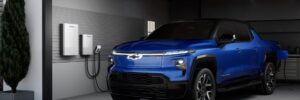GM redirects investment from EVs to V8 engines, lobbies against pro-EV policies

The US auto industry is in serious trouble, and while the current federal administration is setting the tone, most of the damage is self-inflicted. GM, which has been saying for the last few years that it was sort of interested in possibly trying to explore the possibility of aspiring to phase out legacy gas vehicles fifteen years or so in the future (maybe), has slammed on the brakes on its EV production, redirecting previously announced EV investment to producing V8 engines.
In 2023, GM said it would invest $300 million to equip its plant in Tonawanda, New York, to build EV drive units. Now the company has scrapped those plans, and will instead throw $888 million at building a sixth generation of V8 engines at the Tonawanda plant—the largest single investment the company has ever made in an engine plant.
Is the pullback in response to slowing EV sales (as most of the news media is reporting)? Well…not really. In the second half of 2024, GM surpassed Ford and Hyundai to become the number-two seller of EVs in the US. It’s been building on that momentum this year—GM’s EV sales nearly doubled in the first quarter of 2025. In April, GM brands accounted for 14.4% of US EV sales, up 2% from the previous period. Cadillac, which now offers several luxury electric SUV models, is doing particularly well. According to Brad Granz, Cadillac’s Global Marketing Director, its new EVs are attracting buyers from other brands, particularly Tesla.
In April, almost 100,500 new EVs were sold in the US. While this represents a decline of 5.9% from March, EV market share rose to 6.9%, according to Cox Automotive.
Meanwhile, GM is pushing hard to make sure the US Senate votes to revoke California’s emissions waiver from the EPA, which allows the state to set its own higher emissions standards. Among other actions, the company sent an email to employees encouraging them to contact politicians and urge them to vote to revoke the waiver.
This is nothing new—automakers, along with their trade groups and dealers, have a long history of lobbying against pro-EV measures at all levels of government. To justify these self-defeating actions, they often invoke “consumer choice.” And indeed, car buyers do have choices. As GM and Ford pull back from the EV market, Hyundai is expanding EV production at its Metaplant in Georgia. Hyundai and Kia have shown little interest in chanting the “EVs aren’t selling” mantra we’ve been hearing from GM, Ford, Toyota et al. Will that refrain become a self-fulfilling prophecy? Who would want to buy their EV from an automaker that constantly complains that no one wants to buy its EVs?
Sources: LinkedIn News, GM, Wall Street Journal, Electrek, Cox Automotive
Source link
